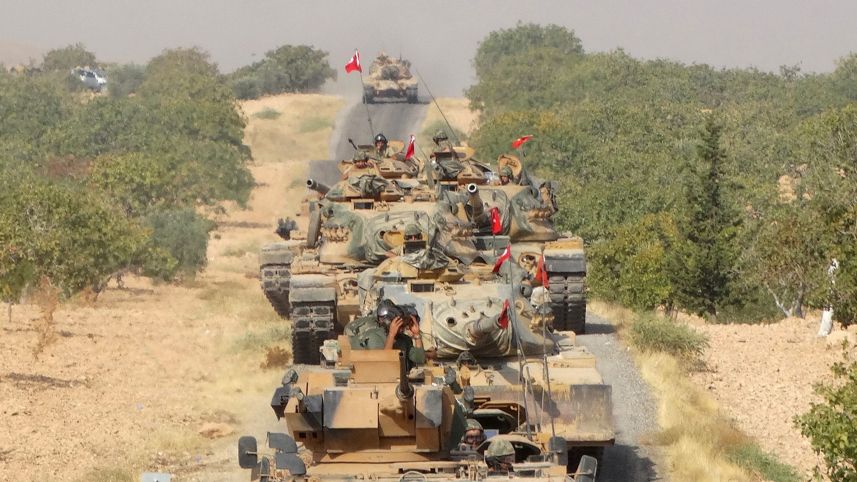
An Iraqi government official unveiled the completion of an agreement between the Iraqi and Egyptian government that stipulates providing Egypt with oil in return for arms. This happened during the visit of an Egyptian delegation to Iraq last week where they met with senior officials, according to al-Arabi 21.
The source said, “Egypt’s Minister of Petroleum and Mineral Resources Tarek El-Molla’s visit to Iraq has accomplished an agreement that provides Egypt with oil in larger quantities than what Cairo used to receive in return for arms and ammunition needed by Iraq.”
He also pointed that the visit of Egypt’s Minister of Petroleum and Mineral Resources Tarek El-Molla’s visit to Iraq was to complete a previous agreement that was issued before by both the Egyptian and the Iraqi sides, adding that it will be implemented after Molla’s visit.
On October 30, the Iraqi Prime Minister discussed, with Egypt’s Minister of Petroleum and Mineral Resources Tarek El-Molla, enhancing cooperation between Egypt and Iraq in the fields of industry and oil & gas; in addition to forming an Egyptian-Iraqi partnership through establishing new cooperation strategies between companies in the two countries, according to a statement released by the Abadi’s press office.
The source -who preferred to remain anonymous- said that “Egypt informed the Iraqi government that it could supply Iraq with the weapons it needs as well as a military equipment maintenance” in return for Iraqi oil exports to Egypt.

The two sides agreed on exporting post-paid 2 million barrels of Iraqi oil monthly at low prices ($3 for each barrel). Egypt can also compensate this through exporting Egyptian shipments of weapons and ammunition needed by Iraq in its fight against the Islamic State (ISIS),” according to the source.
The source said,” The first batch of oil is expected to set off after the completion of technical arrangements next December while an Iraqi delegation will visit Cairo to complete some arrangements with officials in the Egyptian government.”
Some media reports have pointed to the oil agreement between Iraq and Egypt through al-Basra port on the Arabian Gulf, where some Gulf countries will provide technical support in the transportation process. It was also agreed that al-Aqaba in Jordan and Nuwieba port in Egypt will be the other route.
These developments came after Saudi Arabia halted its oil supply to Egypt (700,000 tonnes monthly for 5 years) according to an agreement Saudi Aramco and Egyptian General Petroleum Corporation.
Tensions between Cairo and Riyadh have escalated as a result of Egypt’s divergent stances in sensitive issues to Riyadh.
Egypt has voted in favor of a Russian-backed draft resolution in the UN Security Council on Syria, which was opposed by Saudi Arabia.
As a result, Egypt’s stance has angered Egypt’s major Gulf backer which condemned Egypt’s vote and described it with the” painful” stance.
After the voting, the Saudi ambassador to the UN, Abduallah al-Mouallimi said, “It was painful that the Senegalese and Malaysian stance was closer to the Arab’s consensus than the Egyptian delegation.”
He also said that he feels pity for these countries that voted for the Russian resolution, stressing that his country will continue backing the Syrian people by all means.
Two days following the voting, Saudi state-owned oil company Aramco announced halting oil product supply to Egypt.
Al-Sisi is taking more steps toward the Russian Axis
Some observers believe that the latest Iraqi agreement to provide Egypt with low cost oil for arms came with an Iranian support to pull Egypt in to the Russian, Iraqi, Syrian and the Iraqi camp, taking advantage of the tensions between Cairo and Riyadh.
Observes pointed that “the oil for arms” agreement is another step that came to enhance what has been maintained in Lausanne conference about Syria where Iran requested the lobbying for Egyptian officials to attend the talks on the Syrian crisis, as reported by The Guardian.
The Guardian said that it has seen emails indicating that the Iranian foreign minister, Mohammad Javad Zarif, asked Kerry for Cairo’s team to attend the Lausanne talks. When the US secretary of state proposed six-nation talks to “see if a new reasonableness can manifest itself” in Syria, Zarif replied: “Why not Egypt too?”
Iran agreed to attend the talks only once it had secured places for the foreign ministers of Egypt and Iraq at the discussions, according to the Guardian.
The Guardian also cited a tweet posted by Sadegh Ghorbani, a journalist at Fars – the “semi-official” news agency of the government of Iran, saying that it was “interesting how Sisi’s Egypt is gradually shifting from US-Saudi axis towards Russia-Iran. Tehran-Cairo relations revival maybe question of when not if.”
In the same context, “The members of the National Iraqi Alliance, which is the largest Shiite group in the parliament, have called on the Iraqi government to supply Egypt with crude oil on credit, in response to what they described as “blackmail” practiced by Saudi Arabia against Cairo.”
The Egyptian Saudi relations soared
Carnegie for international peace said in its report titled: “Egypt’s shift from Saudi Arabia to Russia, that “Relations between Saudi Arabia and Egypt, two previously staunch allies, have recently soured. This can be attributed to Egypt’s inability to perform its role as a guarantor of regional Gulf security against growing Iranian hegemony and its desire to cultivate other, less demanding, international allies—most notably Russia.”
According to the report, Egypt disappointed Saudi Arabia in different issues critical to regional issues to Saudi Arabia. In fact, the Egyptian delegation vote in favor of the Russian resolution wasn’t the first in the series of desertion to the kingdom that expected more from the Egyptian regime in return for its generosity.
“The growing rift can also be attributed to Egypt’s inability to fulfill its promises to militarily defend Gulf regional security against increased Iranian penetration in Yemen and Syria, “according to Carnegie.
Abdel Fattah el-Sisi didn’t fulfill his promises to his Gulf financial backer, “AL-Sisi made this pledge himself during his presidential campaign in 2014, when he stated that military intervention to protect the Gulf states is part of the Egyptian’s army doctrine.”
In addition, al-Sisi reiterated Egypt’s commitment to the security of the Gulf states in a meeting with a Kuwaiti delegation in 2016.
According to Carnegie, “This did not stem from the regime’s desire to extend its influence beyond its borders. As was made clear in a leaked recording of a meeting between Sisi and other military leaders, this was instead driven by the need to ensure the continuous flow of Gulf aid, most notably from Saudi Arabia.”
But Egypt has failed to fulfill its promises to keep its side of the bargain.
For example, on Syria the Egyptian position is more aligned with Moscow and Tehran than with Riyadh. In February 2016, when Saudi Arabia said it was ready to send ground troops to Syria as part of the international coalition to fight the Islamic State, after the pro-Assad forces made a number of gains backed by the Russian airstrikes that started in September 2015.
In respond, Egypt said that the readiness to send ground troops to Syria was “a sovereign Saudi decision and not applicable to the Islamic Military Alliance to Fight Terrorism—a Saudi-led coalition including Egypt and 37 other countries.”
Egypt’s decision to publicly from the Saudi announcement reflects its recognition of the alliance’s aim of countering Iranian hegemony in Syria.
Moreover, al-Sisi has declared that Egypt backs the need for a negotiated settlement in Syria, though he did not mention whether this would involve
removing Assad. “But in Saudi Arabia’s view, any acceptance of the Assad regime is also an acceptance of Iranian hegemony over Syria, “said Carnegie.
In the case of Yemen, where the Saudi-led coalition has been involved in a prolonged campaign, the Egyptian position is more ambiguous. “However, the net result is the same, namely token participation.”
Egypt sent naval and air forces to Yemen at the beginning of the war, and it also declared its intention to send ground troops if needed. Even though the Egyptian National Security Council agreed in January 2016 to extend Egypt’s participation for up to one year, “Egypt still has not sent any ground troops to Yemen.”
In fact, the Egyptian military’s participation in Yemen has been “more symbolic and has not met the quality or quantity expected by the Gulf states,” according to Carnegie.
According to Carnegie, al-Sisi is trying to find alternatives to the
the loss of Gulf aid. As a result, Egypt is seeking to enhance its relation with Russia as an economically” that would impose fewer military demands on Egypt.”
In this context, “Egypt has cooperated with Russia in the area of nuclear energy, where it agreed to a $ 25 billion loan on November 19, 2015 to build a nuclear power plant.
In addition, two countries agreed to hold joint military exercises from October 15 to 26. “This has exacerbated the dissonance between Egyptian promises and actions toward the Gulf states,” said Carnegie.
“Ultimately, the public fallout between the two allies was caused by Egypt’s inability to act as a guarantor of Gulf security. In light of that, Egypt is moving toward other, less demanding allies, most notably Russia, “according to Carnegie.
Carnegie suggest that as” the fragility of the Egyptian regime increases, the more likely it will drift more into the Russian orbit and seek similar reliable allies who have the added benefit of supporting its repression of domestic opponents. “
Will Russia be a less demanded ally?
However, will Russia be a less demanded ally to the Egyptian regime or it would ask for more concessions than that requested by Saudi Arabia?
In fact, it seems that less military costs aren’t guaranteed by joining the Russian axis. If Egypt is likely to escape from the Saudi axis to avoid heavy military casualties it seems that this won’t be the case with the Russian axis as well.
Based on observation, different movements infer that Egypt will get more involved militarily by joining the Russian axis.
First, the recent visit official visit of the Syrian National Security Bureau chief Ali Mamlouk to Cairo in October 2016 where he met with General Khaled Fawzy, the head of Egypt’s General Intelligence Service, as well as other senior security officials.
Syria’s state news agency SANA had reported that “The two sides agreed to coordinate political stances,” adding that they also decided to “strengthen coordination in the fight against terrorism.”
In addition, Egypt has recently announced that it would assist the Syrian regime in the siege of Aleppo by helping to deliver aid, as reported by al-Arabi al-Jadeed.
Second, an unconfirmed news has been cited Al-Masdar News (AMN), a news website concerned with the Syrian issue, claiming that a group of officers from the Egyptian Army traveled to the port-city of Tartous, Syria on Tuesday to train with Russia’s military advisors near the Islamic State’s front-lines.
Al-Masdar News claimed it quoted some local activists saying that the Egyptian officers were accompanied by Russian military personnel upon their arrival to Tartous.
In addition, there were also media reports that Egypt will allow Russia to use its military bases as well as its air force for launching military strikes in the Middle East and Africa. But Egypt rejects these reports.
Moreover, Egypt will also lose millions of dollars by giving away its arms-purchased with a fortune at a time the Egyptian people are striving from austerity measures and inflation as a result of Egypt economic crisis.
In addition, the Egyptian armed forces are already fighting vigorous war in Saini against Saini province an affiliated group to ISIS.
On the other hand, joining the Russian axis will push Egypt out of the Arab consensus and thus threaten the Sunni identity.
Egypt’s relations with Russia will not be based on an equal relation that reflects the national security interests of both sides, but in fact Egypt is deserting a national security interest for a short-term interest.
Through these policies, al- Sisi is dropping Egypt’s Arab national dimension from the Egyptian calculations, by supporting the Russian-Iranian axis in Syria, without giving interest to the danger of Syria’s falling under the Shiite control.
The collapse of the Sunni influence in Syria will have in the long term negative repercussions on the whole region as it would facilitate the diffusion of Shiite expansion.
Saudi Oil Supplies to Egypt Halted Indefinitely
Saudi Arabia has informed Egypt that shipments of oil products expected under a $23 billion aid deal have been halted indefinitely, suggesting a deepening rift between the Arab world’s richest country and its most populous, according to Reuters.
On Monday, Egyptian Oil Minister Tarek El Molla confirmed it had stopped shipments indefinitely. Aramco has not commented on the halt and did not respond to calls on Monday.
“They did not give us a reason,” an oil ministry official told Reuters. “They only informed the authority about halting shipments of petroleum products until further notice.”
Visit of Egypt’s Petroleum Minister to Iran Later Denied
Iran’s Foreign Ministry spokesperson has said no Egyptian official would visit Tehran, rejecting media speculations on possible visit by country’s oil minister, according to MEHR News Agency.
Speaking to reporters in Abu Dhabi, Molla said he was not going to Iran. An Iranian oil official later said that a report by the semi-official Mehr news agency suggesting Molla would meet his Iranian counterpart in Tehran on Monday was “incorrect”, reported Reuters later.
Egyptian Prime Minister Sherif Ismail also said Molla was not visiting Iran and Egypt was not negotiating with Tehran over importing oil products, state newspaper al-Ahram reported.
But two security sources and the source in Molla’s delegation said the minister had been scheduled to go, and the low-key visit was now delayed after the news became public, according to Reuters.



